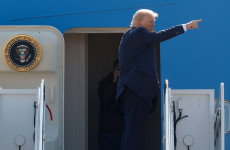Business
EU and US Leaders to Discuss Trade Tariffs in Scotland

Ursula von der Leyen, President of the European Commission, announced that she will meet with Donald Trump, President of the United States, this weekend in Scotland to negotiate over the ongoing transatlantic tariffs dispute. The discussions come just a week ahead of a critical deadline for reaching an agreement, as the two sides seek to avoid potentially damaging tariffs.
Trump arrived in Scotland today, where he plans to balance diplomatic discussions with leisure at his family-owned golf courses in Turnberry and Aberdeen. Ahead of the talks, significant security measures have been implemented in response to expected protests near the resorts.
Impending Tariff Deadline and Negotiation Stakes
As part of his strategy to address trade deficits, Trump has threatened to impose punitive tariffs on numerous countries unless a deal is reached by August 1, 2023. The European Union (EU) is particularly concerned, facing a potential across-the-board tariff increase of 30%. In light of this, EU officials are intensifying their efforts to secure a negotiation framework with the US.
In a statement on social media platform X, von der Leyen confirmed the upcoming meeting, writing, “Following a good call with POTUS, we have agreed to meet in Scotland on Sunday to discuss transatlantic trade relations, and how we can keep them strong.” This statement signifies optimism for a potential breakthrough, although recent comments from Trump have introduced uncertainty regarding the prospects for an agreement.
During his departure from the White House, Trump characterized the chances of reaching a deal as “50-50.” The EU, comprised of 27 member states, has delegated trade negotiations to the European Commission, which is currently focused on avoiding significant tariffs from the US.
Key Details of Proposed Agreement
Discussions are reportedly centered around a proposed baseline tariff of 15% on EU goods, with specific exemptions for crucial sectors such as aircraft, steel, lumber, pharmaceuticals, and agricultural products. Most EU member states appear to prefer any deal over no deal at all, even if it means accepting the 15% levy, highlighting the importance of securing exemptions.
The situation carries a sense of familiarity, as earlier this month, EU officials believed they were close to a resolution before Trump escalated his tariff threats to 30%. Should the negotiations falter, EU member states have prepared a retaliatory package targeting €93 billion worth of US goods, which would be phased in starting from August 7, 2023.
Since initiating his tariffs campaign, the Trump administration has signed only five agreements, including those with the UK, Japan, and the Philippines. The outcome of this weekend’s discussions could have far-reaching implications for transatlantic relations and global trade dynamics.
-

 Top Stories3 months ago
Top Stories3 months agoTributes Surge for 9-Year-Old Leon Briody After Cancer Battle
-

 Entertainment4 months ago
Entertainment4 months agoAimee Osbourne Joins Family for Emotional Tribute to Ozzy
-

 Politics4 months ago
Politics4 months agoDanny Healy-Rae Considers Complaint After Altercation with Garda
-

 Top Stories4 months ago
Top Stories4 months agoIreland Enjoys Summer Heat as Hurricane Erin Approaches Atlantic
-

 World5 months ago
World5 months agoHawaii Commemorates 80 Years Since Hiroshima Bombing with Ceremony
-

 Top Stories3 months ago
Top Stories3 months agoNewcastle West Woman Patricia Foley Found Safe After Urgent Search
-

 Top Stories5 months ago
Top Stories5 months agoFianna Fáil TDs Urgently Consider Maire Geoghegan-Quinn for Presidency
-

 World5 months ago
World5 months agoCouple Convicted of Murdering Two-Year-Old Grandson in Wales
-

 World5 months ago
World5 months agoGaza Aid Distribution Tragedy: 20 Killed Amid Ongoing Violence
-

 World5 months ago
World5 months agoAristocrat Constance Marten and Partner Convicted of Infant Murder
-

 Top Stories4 months ago
Top Stories4 months agoClimbing Errigal: A Must-Do Summer Adventure in Donegal
-

 Top Stories4 months ago
Top Stories4 months agoHike Donegal’s Errigal Mountain NOW for Unforgettable Summer Views









